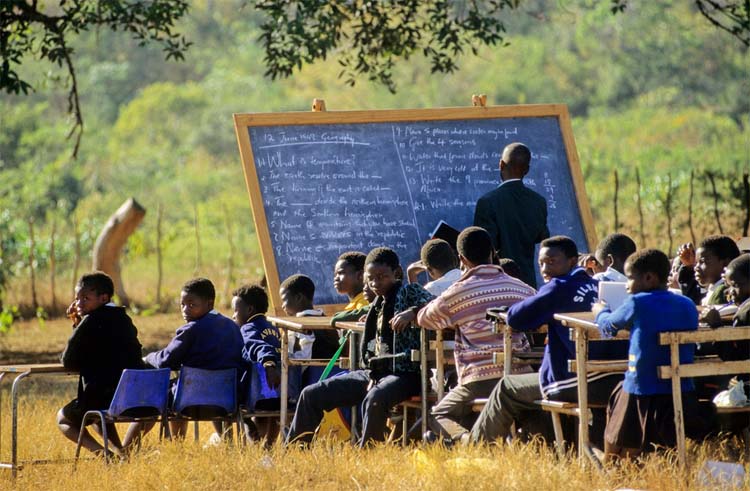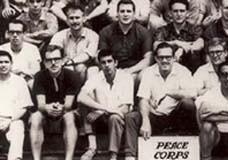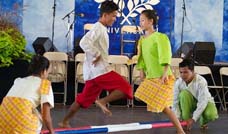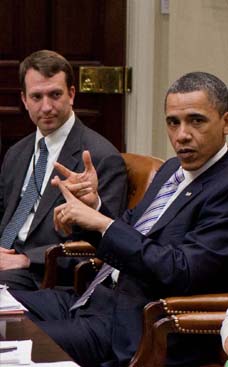
If there was one thing I could change about PST, it would be more openness about the challenges of PST–being treated like a child, being stripped of very basic freedoms, and being forced to learn things you already know. There are legitimate reasons these challenges are part of PST, but when Peace Corps wont publicly acknowledge the existence of these challenges, and wont publicly discuss these challenges in a fully honest way, it sends a message to Trainees that the Peace Corps does not care about the experience of their Volunteers. And this is unfortunate, because nearly everyone I've met who is employed by the Peace Corps wants Volunteers to have as positive an experience as possible and cares deeply about the happiness of Volunteers. During PST, an "us" vs. "them" mentality arose between Trainees and Peace Corps staff. This mentality is not fair, but I certainly did not feel that way during PST. Full honesty, some "real talk" about PST that wasn't just "making you ready to serve" brochure-speak would have gone miles. I think our local staff was very good, and PST could have been much more painful in less skillful hands. But I also didn't feel this way until nearly the end of PST, when it became clear that PST was taking a toll on the staff that was probably worse than its toll on the Trainees. And while the local staff was good about trying to keep our morale up, they didn't openly acknowledge low morale until scheduling issues related to a teacher strike pushed Trainee morale (and staff morale?) to lower lows than I think they had ever seen.
South Africa Peace Corps Volunteer writes: Why Do Peace Corps Volunteers Speak Ill of Pre-Service Training
Why Do Peace Corps Volunteers Speak Ill of Pre-Service Training (PST)?
Many Peace Corps Volunteers look back on Pre-Service Training (PST) as the low point of their volunteer experience. Some even feel it is the most challenging part of the Peace Corps experience (and 5 months into my time at site, I agree). Why?
There are certain skills, knowledge, and experience (called "skills" henceforth in the interest of brevity) that Peace Corps identifies as necessary for the volunteers in any given group to have before being placed at their sites. The purpose of PST to make sure each volunteer possesses these skills. An incoming group of Peace Corps Trainees come from an almost infinite variety of backgrounds. This means that training for any given skill must be designed for the lowest common denominator in the group for that particular skill. Designing the training for a given skill at a level above the lowest common denominator would mean the individual(s) with the greatest deficit in that skill would miss out on something they needed to know.
Making things even more difficult is the challenge of knowing what sort of skills will best serve volunteers at their sites. I'm spending a lot of time teaching and working with computers, but one of the Volunteers I trained with spends a large portion of his time running a poultry and vegetable co-op. Individual volunteer experiences can vary tremendously, even among volunteers with relatively similar sites.
The Peace Corps SA staff did a good job (I personally think) of determining what sort of skills the "average" volunteer needs at the end of training, and geared the training to those skills. Unfortunately, given no single background that qualified one for service as part of our group, the only way training can work is by gearing it towards a completely unprepared individual: the lowest common denominator for every individual skill–the naive volunteer. However, every incoming Trainee has at least some of the necessary background–this is why they have been selected. Thus, every Trainee is forced to deal with material "below their level" at some point (or many points) during PST.
When you're cranky because the roosters woke you at 4AM, malnourished because all you've eaten for 5 days is pap, sauce, and bread, lonely because you miss your loved ones, and you lack the freedom to change your situation with relatively basic solutions you could easily execute while on your own in your host country (earplugs, vegetables, a phone call) you probably aren't going to be in a great mood. And when the stated purpose of limiting your freedom on that particular day is to teach you things that you already know (even if other Trainees don't know these things)…it begins to make sense why so many Peace Corps Volunteers find PST to have been particularly frustrating.
There is one particular PST "skill" that everyone should be able to acquire at their own speed. And that skill is how to accept your host country's culture. Being an experienced teacher who is forced to sit through a week of "Teaching 101″ is unquestionably a test of patience, but it is probably not going to make that teacher a less effective volunteer. However, I believe that a similar forced pace of cultural adjustment has far greater side effects than boredom.
Cultural adjustment does not happen in a moment. It is a process. When you are first exposed to a new culture, your experience of the culture is primarily one of novelty. Since everything is so new and is coming at you so quickly, you don't have time to process most aspects of the culture. You are unable to differentiate between behaviors that are cultural and individual. Being unable to process the culture means that you are unable to form lasting judgments–too much cognitive energy is being spent on remaining alert, being confused, worrying about what sort of strange stimuli you will have to react to next, and for many people trying not to do anything wrong. The "culture" in your mind is a list of unexpected behaviors you have been exposed to.
Sorting out this list of new behaviors and beginning to find the patterns that define the culture takes time. But given enough time, you start to notice specific unexpected behaviors being practiced by multiple individuals. You begin to understand where individuals end and where the culture begins. Finally, you are able to discern which novel behaviors are indeed cultural and not individual. You become able to process the culture cognitively. Unavoidably, you make comparisons to other cultures–most likely your home culture. This is how humans face the unknown–we compare it to the known.
It is important to understand that these comparisons are a matter of personal experience, and not of one culture being "better" or "worse" than another intrinsically.
While some of the comparisons give you positive feelings about the new culture, some inevitably give you negative feelings. The positive feelings are not the problem here–you will probably relish living with these behaviors and taking them on yourself.
So how do you deal with these negative feelings? As human beings, it is natural for us to avoid negative stimuli. This creates a problem when faced with negative feelings prompted by a culture you're living in. And there are really only 2 ways to make these negative feelings go away:
1) Reject the culture (retreat)
2) Accept the culture (immerse)
Option 1 is what creates the ex-pat bars of the world. Unable to deal with the new culture, outsiders huddle together for warmth in an environment where they can reduce their exposure to perceived negative cultural stimuli as much as possible.
Option 2 is clearly superior for everyone in a new culture, especially a Peace Corps Volunteer. The challenge is to that accept the culture, you have to stop being reminded of the fact that you originally perceived aspects of the new culture as negative. To stop being reminded of the judgments you made, you need to minimize your time in your home culture and maximize your time in your new culture–you need to stop making the comparisons (that all humans will inevitably make) and just get used to living a little differently. Only by maximizing your exposure to the new culture and minimizing your exposure to your home culture (until option 1 is no longer tempting) can you start on the path of integration.
And PST makes this impossible. You are spending 8 hours a day plus half or more of each weekend with members of your home culture. You are at the point of maximum negative feelings–you have made all the comparisons and accumulated a set of negative feelings, but you cannot begin to purge the negativity by eliminating the source of comparison (your home culture). You are forced to retreat into an environment of Americans. Yes, you are being trained primarily by members of your new culture. But they have been trained on how to work with Americans. And the vast majority of people you're around are American.
Committing to option 2 is difficult under any set of circumstances. It can be a bit of a shock. Like a swimming pool, the negative stimulus is intense when you jump in. But it is over quickly and the water no longer feels uncomfortable. However, going in a little bit at a time keeps the negative stimulus coming. You just can't shake that chilly feeling until you get your head under.
A fundamental aspect of human cognition is that we respond most strongly to stimuli when they are first introduced. The first bite of food is always the most intense, but by the time the plate is empty it's just food. The first punch is traumatic, but the day after the fight you're just sore. But if you eat the same thing a few hours later, or get in a fight a few days later, that initial stimulus has all of its might back.
The same applies to a new culture–if you keep reintroducing it, the stimulus will remain intense. And when you're yanked out of that culture every morning and reintroduced to it every night, you have to go through that shock over and over again. You get 3 bites, but your food is yanked away before you're bored of it. You keep getting in fights, and remain perpetually bruised and sore. You're prevented from fully committing to option 2, but since you know what to expect you don't have the thrill of novelty. This traps you at the point of maximum negative feelings about the culture.
Do not misunderstand me. I think some Trainees need that trip to America every day, especially at first (we're back to lowest common denominator). Forcing a person to immerse when they aren't ready is going to make them run for home, but a person who is very ready to immerse is probably going to suck it up during the repeated forced retreat into their home culture. Ultimately, the Peace Corps does not want volunteers to leave early. So it is only logical they would err on the side of over-preparing Trainees for immersion.
But not being able to immerse when you're ready causes your negative feelings about the culture to stew, build up, and reinforce. You can't hide from these negative feelings by retreating (unless you quit entirely and head home), and you can't begin the process of truly adjusting to these negative feelings by cutting off your home culture (or at the very least, the adjustment is slowed down considerably). So when you finally do get to site, it takes longer to shake these negative feelings from adjustment–it takes you longer to accept your surroundings than it would have if you could have immersed on your own schedule.
I'm not sure how PST could be changed to address these issues. It is possible it can't. But there are things that Peace Corps can do to make PST easier:
Prepare Us.
Warn Us.
When we're happy at the beginning, take a video of us. Remind us weeks later how happy we were just to be in our host country.
Acknowledge that parts of PST are unnecessary for almost all of us. Don't pretend that most of us need a session on oral hygiene (but a few probably do). Acknowledge that certain sessions exist not because we need them, but because Peace Corps needs them for liability/legal reasons.
Acknowledge the possibility that PST might make cultural integration more difficult for some people.There was a session on dealing with cultural integration, but it was scheduled for the end of training. Why not the beginning?
Acknowledge the complaints Trainees have before they have them. Let's face it–the trainers face many of the same complaints over and over with each group. If it was explained to us repeatedly why PST is how it is in very honest terms I think it would be easier. Acknowledge the low feelings when they are just low feelings and not misery. Help us better understand why we're feeling so down by sharing some of the insights past volunteers have had about their PST experience. Don't leave the volunteer trainers to whisper their insights to us when nobody is supervising them.
If there was one thing I could change about PST, it would be more openness about the challenges of PST–being treated like a child, being stripped of very basic freedoms, and being forced to learn things you already know. There are legitimate reasons these challenges are part of PST, but when Peace Corps wont publicly acknowledge the existence of these challenges, and wont publicly discuss these challenges in a fully honest way, it sends a message to Trainees that the Peace Corps does not care about the experience of their Volunteers. And this is unfortunate, because nearly everyone I've met who is employed by the Peace Corps wants Volunteers to have as positive an experience as possible and cares deeply about the happiness of Volunteers.
During PST, an "us" vs. "them" mentality arose between Trainees and Peace Corps staff. This mentality is not fair, but I certainly did not feel that way during PST. Full honesty, some "real talk" about PST that wasn't just "making you ready to serve" brochure-speak would have gone miles. I think our local staff was very good, and PST could have been much more painful in less skillful hands. But I also didn't feel this way until nearly the end of PST, when it became clear that PST was taking a toll on the staff that was probably worse than its toll on the Trainees. And while the local staff was good about trying to keep our morale up, they didn't openly acknowledge low morale until scheduling issues related to a teacher strike pushed Trainee morale (and staff morale?) to lower lows than I think they had ever seen.
I heard more than a few times that PST would be "challenging", "hard", "difficult", etc. I also heard being a Peace Corps Volunteer can be "challenging", "hard", "difficult", etc. So why is being a Volunteer great and being a Trainee harrowing?
Being a Volunteer also has considerable upsides. Being a Trainee has considerable upsides too, but they come when you're a Volunteer. The thing that really got me through training was Volunteers who came to PST and continually assured us things would get better.
From my perspective, PST was great at the beginning. The first 10 days were quite fun, and a couple weeks afterwards were too. The problem is that when you're told that PST will be "hard" but you get there and it's not so hard and is actually fun…you are completely caught off guard when it is becomes something you just want to be done with.
On the last day of our 10 days of isolation, we woke up and saw this poor guy on the other side of the compound wall:
Poor guy…
Little did I know, this was a metaphor. Or maybe an omen or a sign. I've written about being trapped in a compound for 10 days. But please don't misunderstand me…those first 10 days were fun. It was like summer camp. All these new people, all these new activities, and in a new country! But once the novelty wore off, and once the daily cultural flip-flop started, PST became not so fun. This guy appeared the day we moved out of the compound. I think he was my spirit animal. He died.
By the end of PST, almost every vegetarian had eaten meat, almost everyone in long-distance relationships had broken up, and there were pretty negative feelings all around. The people who handled PST best were the ones who came in caring the least, unfortunately–the ones who didn't care if a session was material they already knew because they didn't pay attention to any of the sessions, the ones who didn't see their homestay as a place to try to integrate but as a guest house, the ones who got their cellphones going the first chance they had. The ones who had the hardest time were the ones who really tried to get as much out of PST as possible.
Perhaps the true tragedy of PST is that the more you buy into the training process at the beginning, the greater the fall when the honeymoon ends. Of course, the Peace Corps can't punish people for simply not caring–as long as PST lasts for more than a few weeks, people will want it to end before it does. And when you find yourself wanting out of something that was pretty great just a few weeks ago it is not a positive feeling. But if you're disinterested from the beginning, you never experience that fall.
In retrospect, the real lesson learned at PST was that you just have to let go when you can't control things. Being in the Peace Corps is a test of patience and adaptability. And while you can say many things about PST, we all certainly learned patience and adaptability. In that sense it was unquestionably a success. With the scheduling challenges created by the teacher strike, our patience and adaptability were tested even further. We probably came out of PST better prepared than most groups of Trainees. We have Ph. Ds in patience and adaptability.
But did it really have to be so bad? During the last few weeks of PST I had to sneak off to cry almost every single day for reasons I still don't understand (I also took PST worse than most).
And did we really have to come out of PST with negative feelings about an organization we had been so eager to join?
That's not a rhetorical question. Maybe there isn't a better way of turning a bunch of ‘mercans into PCVs. PST makes being a Volunteer feel easy, and isn't that the point? I think a lot more of us would be in the USA right now without PST. But it is difficult to process PST rationally when the memories are more emotional than episodic.
















